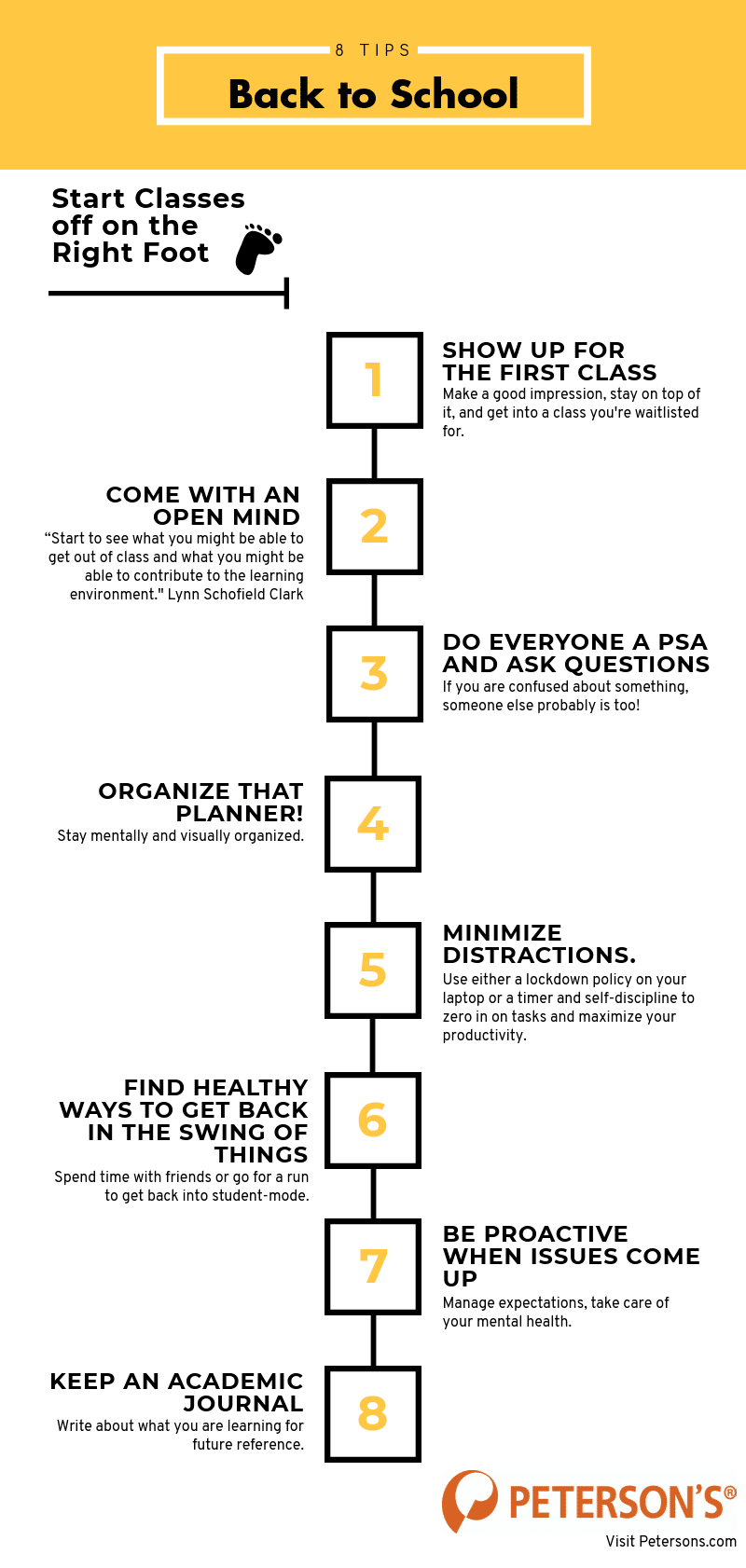The start of the school year brings the promise of a fresh start and students with a bit more pep in their step. Even if you’re a seasoned college student, there’s something exciting about heading back to school.
Starting things off on the right foot will keep you thriving throughout the semester. We talked to Dr. Lynn Schofield Clark, Chair and Professor of the Department of Media, Film and Journalism Studies at the University of Denver about how to accomplish this. Use these simple tips to help you get in the swing of things as you settle into the school year.
1. Show up for the first class session.
To some, this may seem like a no-brainer, but you’d be surprised at how many college students skip the first class. Students assume that since they will mostly be making introductions and going over the syllabus, there’s no need to show up. However, this is a bad idea for a number of reasons.
First, your professor will have a poor first impression of you if you can’t be bothered to show up. Students who email the professor later or just show up for the next class make themselves look lazy or unwilling to make an effort in the class. It’s also easy to fall behind in fast-paced college courses and you’ll miss a lot of details about assignments, projects, and exams that the professor will go over on the first day. You may find yourself confused, and spending the time you thought you saved having to go to the professor’s office hours to get the full explanation.
Second, if you are waitlisted for a class you want to take, showing up can get you in.
“Show up for the first class even if you’re not enrolled in the class yet because if anyone is not there, see number one, then you’re likely to be able to enroll in the class and the professor will appreciate your enthusiasm for the class that you expressed just by showing up,” said Clark.
If all you have to do is show up to make a good impression and get things rolling, you have a pretty easy job. This won’t always be the case, so take advantage of it while you can!
2. Come with an open mind.
When you’re getting a feel for the class, stay open to learning what the class will be about, even if it’s not exactly what you expected or if the professor teaches in a less conventional fashion.
“Start to see what you might be able to get out of class and what you might be able to contribute to the learning environment,” said Clark.
Part of this focus also includes setting aside things like social media. While tempting to zone out the lecture, focus on how the professor is presenting the class so you can really synthesize what is being said.
3. Do everyone a public service and ask questions.
You’ve heard it before–if you’re confused about something, someone else probably is too. Don’t be afraid to speak up and ask those questions.
Especially as a first year student, professors who teach multiple course levels often forget that freshmen are in a new environment on all fronts. New students may be unfamiliar with things like assignment types or academic lingo that upperclassmen have had a chance to get used to.
Not everyone has the self-confidence to speak up in class, but finding your voice will be a relief for yourself and others.
“It’s basically a public service if [students are] asking for more clarification,” said Clark.
4. Organize that planner!
Organizing–and keeping–a planner is your best way to stay mentally and visually organized. Whether you prefer Google calendar or a colorfully bound book from Target, find a planner that works for you. Then, start things off by writing in your due dates. A professor will usually give you a syllabus of some form on the first day. This may be digital or hard copy, but take some time to write in important dates like test days, assignments, and project due dates, review sessions, etc. Write in your class times as well so you can block out that time and organize study time and other activities around it.
Keep in mind due dates do sometimes change. A professor will rarely move a due date forward, usually pushing it back. You can always change this in your planner, but having an idea of when you have things due will keep you on top of your work throughout the semester.
5. Minimize distractions.
“One of the things that I think is the most challenging about staying organized is just getting past the distractions that are a part of everyday life,” said Clark.
Use either a lockdown policy on your laptop or a timer and self-discipline to zero in on tasks and maximize your productivity. To do this, determine an amount of time you want to devote your attention to a project or assignment. An hour is usually a good chunk. Set a timer–and a lockdown policy if you don’t trust yourself–and get to work. During this time, you are completely focused on the task at hand. Your school might provide downloadable lockdown browser programs, or you can get one here.
“After you sit down for 15 minutes and get focused then you can kind of get into a flow. Figure out what works for you to discipline yourself to get into it and then you’ll get things done much more quickly,” said Clark, who uses this method herself.
She admitted the difficulty of focus at the beginning, but the effectiveness of getting over the hump and into a rhythm.
6. Find healthy ways to get back in the swing of things.
Students often go to the first class of a difficult course and become overwhelmed by the amount of work they see they will need to do over the duration of the semester. Some students blow off this steam in an unhealthy way, starting the year off on a bad note.
“The good students are able to take a step back and do something that is healthy for themselves. Whether that means spending a little time with their friends or going on a run, doing something that will be helpful for them as they’re starting to focus into the new lifestyle that they have as a student,” said Clark. She explained that activities like this that are both healthy and constrained will help people get back in the mode of being a student.
7. Be proactive when issues start to come up.
Clark explained that there are two main issues that tend to cause students trouble early on and can result in consequences if not taken care of.
The first common issue is mental health. Mental health issues tend to manifest in the college years. Sixty-four percent of young adults who are no longer in college are not attending college because of a mental health related reason.
“One of the key things that students need to do is if they start feeling like they’re overwhelmed and they can’t finish things, or there’s something else going on, it’s really important for them to make that first step and contact the professor and see the professor in person if possible,” said Clark.
As colleges and universities across the country strive to better address mental health, professors receive training on how to handle these types of situations and are aware of available student resources. Discussing concerns with the professor early on is the best way to make a plan that will help you mentally and academically.
“Acknowledge that we are all human and if you’re having difficulties completing the classwork contact the person as soon as possible,” said Clark.
The second issue Clark says she notices is first-year students and teachers having differing expectations. This is typically students who did very well in high school, but their college courses have higher expectations and their grades and feedback are not what the student thinks they deserve. College courses demand quality work on a level that may be higher than many high school classes, and this is an adjustment that will have to be made.
“Look on your campus to see what resources are available to help you. Those are often resources that are external to this particular class,” said Clark, who suggests resources like your school’s writing center.
See also: Making the College Transition.
8. Keep an academic journal.
What is an academic journal you may ask? Similar to a journal, but instead of writing about how you’re feeling (which is great to do too!), write about what you’re learning. College classes move quickly and you forget things that you later might find useful, but if you write them down, you’ll be able to look back. You may find things you learned in one class that you can use for another, or ideas you had for a future essay or other assignment.
“It’ll help you to have breadcrumbs to follow your way back about what you learned over that quarter and how that might be useful or interesting as you move forward. It’s a way for you to gage your own progress as you grow,” said Clark.
Starting the school year off right sets you up for success and gets you in the swing of productivity and productiveness, and having a plan helps you go in feeling confident and prepared to tackle your schedule. Keep these tips in mind this school year.
For quick reference, here’s a handy infographic of your back to school tips:




